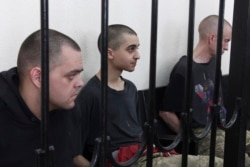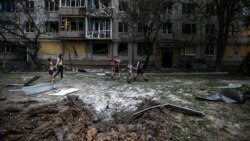On June 9, a court in Russian-occupied Donetsk, Ukraine, sentenced two British nationals and one Moroccan to death for taking part in the war on Ukraine.
The three are accused of engaging in “mercenary activities and committing actions aimed at seizing power and overthrowing the constitutional order.”
The Russia-controlled court ordered their executions by firing squad after a two-day trial. They have one month to appeal.
Liz Truss, the U.K. foreign secretary, condemned the sentencing of Aiden Aslin and Shaun Pinner, who she said are being “held by Russian proxies in eastern Ukraine.”
“They are prisoners of war," Truss said on Twitter. "This is a sham judgment with absolutely no legitimacy.”
In response, Russia’s Foreign Ministry spokeswoman, Maria Zakharova, rejected the notion that the men are POWs with rights under the Geneva Conventions.
“They are mercenaries and not prisoners of war. Mercenaries sent by the West to assist the nationalist regime in Kiev are not combatants and are not entitled to the status of prisoner of war under international humanitarian law,” Zakharova said.
That is false.
Aslin, Pinner and Moroccan Saaudun Brahim were captured while serving with Ukraine’s armed forces. While captured mercenaries do not have the same protections as POWs under the Geneva Conventions, rights groups and United Nations officials say the three are not, in fact, mercenaries. As such, they are entitled to the same protections as other soldiers.
The Office of the United Nations High Commissioner for Human Rights (OHCHR) condemned the death sentences, which came from a court in the self-proclaimed Donetsk People’s Republic (DNR), which only Russia recognizes. “Such trials against prisoners of war amount to a war crime,” said OHCHR spokesperson Ravina Shamdasani.
The spokesperson for United Nations Secretary General’s office, Stephane Dujarric, reaffirmed U.N. opposition to the death penalty, calling on all combatants detained in Ukraine “to be afforded international protection, and to be treated according to the Geneva Conventions.”
Denis Krivosheev, Amnesty International’s Deputy Director for Eastern Europe and Central Asia, also called the verdicts “a blatant violation of international humanitarian law on so many counts.”
“The three were members of the Ukrainian regular forces and under the Geneva Conventions, as prisoners of war, they are protected from prosecution for taking part in hostilities,” Krivosheev said.
Aslin and Pinner were both serving with the 36 Brigade First Battalion of the Ukrainian Marines. They were captured in April after taking part in the defense of the port of Mariupol, which is now occupied by Russia.
Rather than being “sent” by the West, both men were living in Ukraine prior to Russia’s invasion and had reportedly joined the Ukrainian Armed Forces in 2018.
Aslin, has a Ukrainian fiancé and is a dual British-Ukrainian citizen, the BBC reported. Pinner has a Ukrainian wife.
Brahim joined the Ukrainian marines in November 2021, Catherine Norris Trent, a senior reporter for France 24, wrote on Twitter. Brahim surrendered to Russian forces near the city of Volnovakha in the Donetsk region in mid-March.
Prior to enlisting, the 21-year-old Brahim was a student at the Institute of Aerospace Technologies at the Igor Sikorsky Kyiv Polytechnic Institute. His father told the Moroccan Arab-language news site Madar 21 that his son also holds Ukrainian citizenship, reported Radio Free Europe/Radio Liberty, a sister U.S. government news organization to the Voice of America.
As previously reported by Polygraph.info, The Third Geneva Convention, concerning the treatment of prisoners of war, states that “members of the armed forces of a Party to the conflict as well as members of militias or volunteer corps forming part of such armed forces” are one of four categories of people who “have fallen into the power of the enemy.”
It also says that members of other militias and volunteer corps, including “organized resistance movements,” enjoy prisoner of war protections if they meet four conditions:
- Being commanded by a person responsible for his subordinates;
- Having a fixed distinctive sign recognizable at a distance;
- Carrying arms openly;
- Conducting their operations in accordance with the laws and customs of war.
In its guidance on legal protections for combatants in a war, the International Committee of the Red Cross says a mercenary is "a person who takes a direct part in hostilities motivated essentially by the desire for private gain."
By comparison, "A national of a neutral State who enlists in the armed forces of a party to the conflict is not a mercenary," the Red Cross says.
Mercenaries also cannot be “a national of a Party to the conflict or a resident of territory controlled by a Party to the conflict.”
All three men were residing in Ukraine prior to the invasion. As previously noted, Aslin and Brahim reportedly had Ukrainian citizenship. Pinner's actual residency status is unknown.
Still, Aslin, Brahim and Pinner were “members of the armed forces of a Party to the conflict” -- the Armed Forces of Ukraine. Therefore, they do not qualify as mercenaries.
Prisoners of war can be tried for a war crimes. However, for such legal proceedings to go forward, “there must be sufficient admissible evidence, and fair trial standards must be ensured,” Krivosheev said.
“[T]hey were not tried by an independent, impartial regularly constituted court but by Russian proxies. The so-called ‘charges’ against them would not constitute war crimes. And most outrageously of all, the taking of their lives as result of the grossly unfair proceedings would constitute arbitrary deprivation of life,” Krivosheev said.
The DNR has been marked by lawlessness and criminality since Russia helped create the breakaway republic after fomenting war there in 2014. Arbitrary arrest and imprisonment are rampant. The prospect of a fair trial is low.
Shamdasani also noted the lack of legal legitimacy in the DNR, and its neighboring breakaway entity, the Luhansk People’s Republic.
“Since 2015, we have observed that the so-called judiciary within these self-contained republics has not complied with essential fair trial guarantees, such as public hearings, independence, impartiality of the courts and the right not to be compelled to testify,” Shamdasani said.

